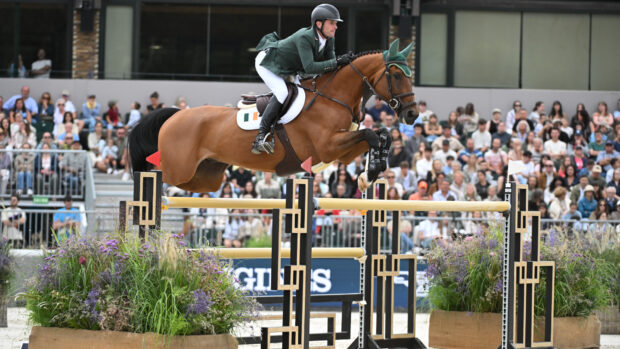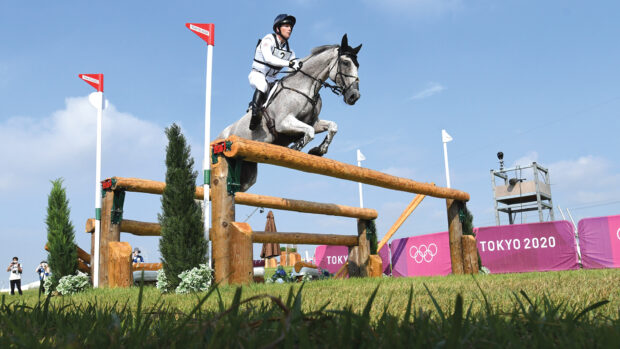An emergency FEI rule change banning the use of “unnatural foam” on horses’ mouths, likely to mask oral issues, has been welcomed – although the “true impact of any rule lies in its enforcement”.
At the FEI board meeting last month, a dressage and para dressage rule was replaced by the new general regulation, applicable in all disciplines from 1 July. It bans any substance or product inside or around the horse’s mouth or tongue that “may imitate, induce or cause foaming or coat or otherwise cover, or partially cover the bit”. Breaking the rule will incur a yellow warning card and elimination.
An FEI spokesperson told H&H that before the meeting, the federation had been sent “numerous images from FEI events showing horses’ mouths covered in thick sticky foam”.
“The FEI investigated the cause and concluded that this unnatural foaming was very likely induced by excessive feeding with treats composed of icing sugar and a binder (gelatine, bee wax, gum arabica etc),” the spokesperson said. “There are strong indications that it is used to mask issues in the oral cavity such as discoloration of a horse’s tongue and gums.
“As such practice is very clearly against horse welfare and has the potential to be harmful to horses’ health, the FEI acted quickly and robustly by explicitly banning the practice.”
All riders, federations and officials have been told of the rule, which replaces one banning substances such as marshmallow fluff around horses’ mouths to imitate foaming.
Deliberate obscuring
Mette Uldahl, a leading researcher in animal welfare and behavioral science who has co-authored research on mouth lesions in dressage horses, welcomed the rule. At a recent European Parliament meeting on horse welfare, Dr Uldahl shared pictures “clearly showing the use of sticky substances inside the mouths of dressage horses, covering the tongue and oral mucosa to such an extent that it deliberately obscures visual assessment of tongue coloration or bit-related lesions”.
“The FEI was at this meeting and I am glad to see they reacted,” she told H&H.
“The true impact of any rule, however, lies in its enforcement. I hope and expect a strict and transparent enforcement protocol is in place for FEI to succeed with this step forward for horse welfare.”
Dr Uldahl said this need to strengthen an existing rule emphasises the point that “we cannot rely solely on riders and trainers to uphold welfare standards”.
“The sport is driven by strong human interests; social status, competition results and financial gain, all of which can create incentives to exploit grey areas in regulation,” she said. “It is therefore essential riders support governance of horse welfare to remain firmly in the hands of regulatory bodies, such as the FEI. Yet we must also recognise that the FEI is not entirely independent; all its members are deeply embedded in the culture and traditions of equestrian sport. This is precisely why independent, external oversight is vital, to ensure that welfare governance maintains an arm’s length from the competitive interests it seeks to regulate.”
Dr Uldahl said such substances are “clearly uncomfortable” for horses, especially with rein pressure, there is no need to use them, and that the purpose of them is to conceal poor welfare, such as lesions or tongue discolouration.
“This renders it not only unjustifiable, but doubly concerning, as it masks more serious underlying welfare issues,” she said. “Applying sticky substances in a horse’s mouth is fundamentally incompatible with any claim of prioritising equine welfare.”
Dr Uldahl likened the substance use to other examples of “concealment”, such as over-tight ear bonnets and nosebands.
Troubling pattern
“These practices reflect a troubling pattern: rather than embracing change that improves horse welfare, parts of the sport seek out loopholes to preserve outdated or contentious methods,” she said. “This is why independent scrutiny and persistent external pressure are so important.
“Ultimately, the true winner in equestrian sport is the rider who presents a comfortable, confident horse, one whose body and body language remain free and unmanipulated beyond what is necessary for humane, ethical riding.”
Olympic dressage rider Richard Davison told H&H the use of marshmallow fluff or similar was never widespread, but some riders tried it to mask the appearance of horses’ tongues.
“Frankly, it looked ridiculous and nothing like real saliva,” he said. “It only drew more attention to the horse’s mouth so was counterproductive. I don’t suppose the new provision will affect many other FEI disciplines much as it is only in dressage where the appearance of the tongue is penalised and affects the final result. However I welcome the extra clarity of the new provision and always thought the practice was a nonsense.”
- To stay up to date with all the breaking news from major shows throughout 2025, subscribe to the Horse & Hound website
You may also be interested in:

Concerns over horses’ ‘blue tongues’ and open mouths pictured at World Cup qualifier

Why we are seeing blue tongues in dressage arenas – and what needs to be done about it

‘Horses can show conflict behaviours and still win’: concern over links between mouth opening and oral lesions in dressage

Sport horses’ welfare back on the EU agenda: rider education is ‘urgently needed’

Subscribe to Horse & Hound magazine today – and enjoy unlimited website access all year round




